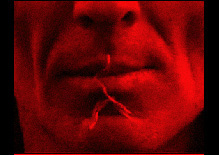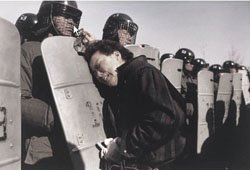…քո ներսի Աստվածը ընդվզում է քո ներսի Սատանայի դեմ, ու նրան չի կանգնեցնում անգամ խաչվելու հեռանկարը: Նա չի ձգտում հրեշտակ երեւալ, նա ցուցադրում է, որ իր ներսում Աստծո եւ Սատանայի պայքարը չի ընդհատվում ու չի ընդհատվելու ոչ մի վայրկյան, եւ նա իր ներսի Սատանային հաղթելու համար ուրիշներին օգնության է կանչում: Նա չի ուզում լինել հերոս, նա ուզում է լինել Քաղաքացի...
vendredi 28 novembre 2008
dimanche 23 novembre 2008
Human rights Public figures join hunger strike of political prisoners in Armenia
Eight members of the "Committee in Defence of Political Prisoners" have stated that they join the protest action of 28 political prisoners who had announced a one-day hunger strike as a protest action against the "hypocritical and inconsistent policy of the Council of Europe."
Among those who have joined the protest action are the following persons: well-known film director Tigran Khzmalyan, human rights activist Vardan Arutyunyan, former vice-speaker of parliament and former political prisoner Karapet Rubinyan, commander of special battalion "Shushi" lieutenant colonel Zhirair Sefilyan, chairman of the NGO "Women of Armenia" Gayane Martirosyan and others.
"As a sign of solidarity with our comrades, who continue their heroic struggle for free and democratic Armenia even in prison, we, the members of the 'Committee in Defence of Political Prisoners', announce our own hunger strike on November 20," runs the statement of the Committee.
We remind you that the imprisoned activists of the opposition have declared their intention to hold on November 20 a one-day hunger strike in protest against "inconsistency and hypocrisy of the Council of Europe."
28 activists have disseminated their statement addressed to the Supreme Commissioner for Human Rights of the Council of Europe Thomas Hammarberg and running that despite their deep respect to his person and activities they refuse to meet him. They have motivated their refusal by passiveness of European bureaucratic structures.
The authors of the statement express their bewilderment with the fact that the European structures and, first of all, the Council of Europe, having in their hands a full set of facts about lawlessness and falsifications on the elections, have recognized the officially proclaimed results of the elections, having untied the hands of the ruling administration to launch repressions against their own people, and "to savagely disperse peaceful meetings and hold bloody massacres."
Among the authors of the statement are the former deputy general public prosecutor Gagik Dzhangiryan, former minister on incomes and member of the board of the "Republic" Party Smbat Aivazyan, and other activists of the opposition, namely: Vardan Malkhasyan, Musheg Sagatelyan, David Matevosyan, Samvel Karapetyan, Tigran Melkonyan, Petros Makeyan, Ashot Zakaryan and others.
See earlier reports: "Hammerberg reveals results of studying post-election events in Armenia," "Armenia: rallies in defence of political prisoners continue," "In Armenia, two residents of the city of Maralik go on hunger strike in support of arrested oppositionist," "Armenians of Europe rally in Brussels to protest on events in Yerevan."
Author: Lilit Ovanisyan, CK correspondent
Caucasian Knot information
samedi 22 novembre 2008
THE FINAL PHASE OF THE RESOLUTION OF THE KARABAGH CONFLICT
Levon Ter-Petrosyan’s Interview to the A1+ News Agency
Mr. President, in your speech on 17 October you had promised always to keep the society informed about the developments concerning the resolution of the Karabagh conflict. Would it be correct to regard the meeting between the presidents of Russia, Armenia, and Azerbaijan – Medvedev, Sargsyan, and Aliyev – as one such development?
First, I have not forgotten my promise. Moreover, in order to make our conversation more grounded, I would like to remind the readers the appropriate excerpt of the speech: “We are going to witness developments of utmost importance regarding the resolution of the Karabagh conflict in the upcoming several months, which at this stage make our domestic problems secondary. We are going to follow these developments carefully, to assess the adequacy of the steps taken by the Armenian authorities in response to the situation, always to keep the society informed about the process of resolving the Karabagh conflict, and to thwart or minimize the threats to the interests of the Armenian side.” As for your question, the Moscow declaration should definitely be considered as one of the most important developments in the process.
Some people have gotten the impression that the declaration is more of a formality and that it is devoid of any real content.
Only people unfamiliar with the details of the process of resolving the Karabagh conflict can form such an erroneous impression. For experts it is just the opposite - a very telling document, because it clarifies several principal and specific issues. We should also realize that the document is just the tip of the iceberg, and that it has a very comprehensive base, the content of which is not difficult to guess.
Which are the principal and specific issues you referred to?
The very first article of the declaration contains a worrisome formulation, according to which “the conflict in Karabagh will be resolved according to the principles and norms of international law, as well as the decisions and documents adopted on their basis.” It is not the platitude about the “principles and norms of international law” that is the source of concern here, but the mention of the “decisions and documents adopted on its basis.” The latter presupposes, undoubtedly in response to Azerbaijani demands, the Resolution 62/243 of the General Assembly of the UN and the Resolution 1614 of the Parliamentary Assembly of the European Council, which recognize Azerbaijan’s territorial integrity and demand the withdrawal of Armenian forces from Azerbaijani territories adjacent to Karabagh.
The second article of the Moscow declaration states unequivocally, that the Madrid proposal submitted by the co-chairmen of the Minsk Group on 29 November, 2007, will form the basis of the resolution of the Karabagh conflict. Since I have discussed the content of that proposal in detail in my 17 October speech, I am not going to talk about it now. I would like to remind only that the harmonization of the two [relevant] principles of international law – the sanctity of territorial integrity and the right to self determination – is the essence of that proposal.
The preamble and article 4 of the declaration talk about the resolution of the Karabagh conflict through the ongoing direct dialogue between Armenia and Azerbaijan, which in essence defines a new format regarding the parties to the conflict. The declaration thus buries once and for all the resolution adopted during the Budapest summit of 1994, which had recognized Nagorno-Karabagh as a full, third party to the conflict with all the appropriate rights. This means that Karabagh is going to have no role in the subsequent negotiations that are going to decide its fate.
The fact that the two conflicting parties – Armenia and Azerbaijan –have essentially given their consent to the Madrid principles, must, nonetheless, be considered the most important result of the Moscow declaration, which is an unprecedented event in the entire process of [negotiations] to resolve the Karabagh conflict. The problem is that the three previous proposals of the Minsk Group co-chairmen – the “phased plan,” the package deal,” and the idea of a “common state” - have not received the approval of the conflicting parties, and have therefore been taken out of the agenda. Both the “phased plan” and the “package deal” were rejected by Karabagh, while the “common state” idea was rejected by Azerbaijan. The signatures of Serge Sargsyan and Ilham Aliyev on the Moscow declaration signify the beginning to the final phase of the resolution of the Karabagh conflict.
Didn’t you forget the Key West proposal?
The Key West proposal was not an official proposal of the co-chairmen of the Minsk Group. But regardless, that proposal also was not accepted by one of the parties – Azerbaijan.
Doesn’t the Russian initiative contradict the opinion expressed in your latest speech that the decisive role in resolving the Karabagh conflict will be played by the West?
Not at all. Even though the meeting in Moscow is a turning point, it is just the beginning of the process. The process now continues in Europe, and it will in all likelihood end in the United States in December. In other words, even though the apparent honor of opening the process has been granted to Russia, the sole power of ending it will belong to the West. Both Sargsyan and Aliev have participated in the Moscow meeting if not under duress, then with poorly veiled reluctance. Despite the differences in their reasons, they both are going to prefer the West’s mediation.
What role will be granted to the Minsk Group, which, the declaration insists, should continue to exists and operate?
The more the role of the Minsk Group is emphasized and the more compliments are made in its address the deeper the suspicions about disagreements inside it become. Despite being a useful instrument, it is basically a diplomatic cover for achieving the aims of the mediator countries.
Political tensions sow discord in Armenia
The Financial Times
By Haig Simonian, recently in Yerevan
Published: November 3 2008
Gathered for an evening of talk and music to celebrate their city’s anniversary, the mood is palpably upbeat among the crowds in Republic Square, the traditional meeting place in Armenia’s capital.
Clever lighting brings out the best in the four stately curved buildings that define the huge space, as popular for gatherings in communist times as it is today. In front, a large stage stands by the neo-classical national museum for the rock band and assorted dignitaries involved.
But once the music stops on the dot of 11pm, the square in Yerevan empties in minutes. As the stragglers leave, no less than 12 police cars descend on the increasingly deserted space, warning lights ablaze.
Their presence is a reminder of the political tensions that lurk below the surface, even eight months after contested presidential elections. Within days of the February vote, unrest erupted as Levon Ter-Petrosian, the country’s first post communist president, accused the victor Serge Sarkisian, a former defence minister, of ballot-rigging.
Mr Ter-Petrosian was seeking a return to power after being ousted in 1998 by Robert Kocharian, Mr Sarkisian’s mentor. His claims and subsequent big public demonstrations culminated in a police crackdown that left 10 dead and 75 opposition supporters in prison.
On this particular evening in Republic Square, there are no incidents. But, opposition leaders say political repression is still widespread in one of the most strategically significant parts of the Caucasus.
Armenia is not alone in facing accusations of repression and electoral fraud. Neighbouring Georgia has seen growing criticism of the allegedly authoritarian rule of president Mikheil Saakashvili, though there has been greater unity since the country’s brief conflict with Russia. And in Azerbaijan, last month’s elections produced predictable claims by the opposition that the polls were a sham.
Armen Harutiunian, Armenia’s ombudsman and the man entrusted with protecting human rights, says the government has resorted to “the methods of 1937” to consolidate power and curb opposition, referring to Stalin’s purges.
Mr Harutiunian, a lawyer who headed Armenia’s public administration academy before his appointment in 2006, is equally dismissive of parliament, which he says is overwhelmed by parties loyal to the government.
“The government only wants an opposition for decoration to please the west. There’s no real opposition,” he argues.
Mr Harutiunian swats away the official investigation set up to examine the post election violence as “a farce”. And he claims the government has applied direct and indirect pressure to limit his own efforts to uncover political abuse.
Opposition leaders reinforce such claims. Levon Zouhrabian, a top official of Mr Ter-Petrosian’s Armenian National Congress party, accuses the government of taking unprecedented action to restrict freedom of speech. “There are people who have spoken out and regretted it, but we are not afraid”, he says. Such comments are echoed by MPs from the Jarangoutioun (Heritage) party, the only opposition group still represented in parliament.








